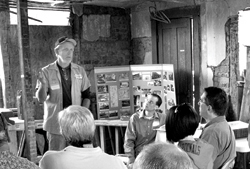



Museum Culture
Open
Air Museums group
to meet in Madison
Living
history is a big part of
educating public about the past,
these experts say
By
Lela Jane Bradshaw
Contributing Writer
(March 2012) – Having spent 14 years as an historic
interpreter in open air museums, Pat Cunningham has a great deal of
experience challenging visitors to expand their concepts of what museums
should be. Rather than presenting cold artifacts in glass cases, workers
in open air museums bring historic buildings and sites to life by showcasing
the artifacts in the actual environments where they would have been
used and demonstrating trades common to life years ago. At these museums
plows are not behind velvet ropes, but out in the fields, being pulled
by oxen.
|
The Midwest Open-Air Museum Coordinating Council will hold its spring conference March 8-10 in downtown Madison, Ind. The theme is “Thinking Outside the Box: The Community as a Living History Site.” Session include hands-on historic preservation, tins plate work, treadle sewing machines, tintype photography, teaching with living history and more. For details, visit www.momcc.org/conferences.html. There is still availability to attend this conference, which will focus on some of Madison, Ind.’s outstanding assets. |
Now Cunningham is preparing to challenge museum professionals
to expand their own ideas about what constitutes an open air museum
at the Midwest Open-Air Museum Coordinating Council’s spring conference
in Madison. The conference is planned for March 8-10 at various locations
in town.
With a theme of “Thinking Outside the Box: The Community as a Living
History Site,” Cunningham and fellow organizer Walt Dubbeld are
hoping to encourage participants to think about historical education
in a larger context.
“We’re saying the community is a living history museum,”
Cunningham notes.
Conference organizers hope to draw approximately 150 participants from
across the Midwest to exchange ideas through seminars, interactive workshops
and social events.
“Most of the people are professional museum people,” says
Dubbeld. He expects museum directors, historic interpreters and re-enactors
to attend. The organizers themselves have a strong background in historical
fields, with Dubbeld having been involved in re-enactment since 1977.
Cunningham says the group was “partially founded around my kitchen
table when I was living in Iowa” in 1978. This will be the first
time that the conference will take place in Madison, and the organizers
explain that they are taking a slightly different approach from past
conferences.
Rather than selecting one specific historic site – such as the
Lanier Mansion or Eleutherian College – as a base for all
the events, this spring conference encourages participants to think
more broadly about the idea of open air museums.
“We’re using the whole town as an historic site,” explains
Dubbeld. Conference sessions will be held at different downtown sites,
including the Livery Stable, Trinity United Methodist Church, and the
Madison-Jefferson County Public Library. The Madison Trolley will be
used to show conference goers the town. Stops are being planned at such
historic sites as the Schofield House, Sullivan House, and the Schroeder
Saddle Tree Factory.
 |
|
Photo
courtesy of Donna Weaver Plaster
and historic restoration |
Many of the conference sessions will touch on the idea
of considering open air museums as part of the community rather than
focusing on the sites in isolation. Mike Follin with the Ohio Historical
Society will discuss ways of taking museum programs off-site and speaking
directly to groups such as service clubs and senior citizen organizations.
Dubbeld will discuss ways of using folk and music festivals to fundraise
at historic sites.
Madison is ideally suited to get people thinking about ways that museums
intersect with living communities, the organizers say. “The whole
downtown is an historic landmark,” stresses Dubbeld, “It doesn’t
have to be a museum, per se, to be an historic site.”
In keeping with the theme of community involvement, vendors will be
open to public Thursday through Saturday with most setting up at the
Feed Mill at 301 West St. History lovers are encouraged to take a step
back in time as they shop for unique and historically accurate ironware,
utensils or maybe even get a tintype photograph made of themselves.
Regency Revisited, owned by Dubbeld and his wife, Jan, will offer hand
block printed fabrics and sewing items for those looking to craft their
own projects, as well as straw hats and wool shawls for that final touch
for period outfits. Cunningham will offer reproduction sheet metal items
and also will provide a full service shoe repair shop, specializing
in 18th and 19th Century repair work at Binzer Framing. This storefront
set up will allow shoppers to speak directly with vendors and learn
more about what goes into creating these products.
• For more information, visit: http://momcc.org.Vendors will be open at 301West St. from noon to 6 p.m. Thursday; 9 a.m. to 6 p.m. Friday; and 9 a.m. to 5 p.m. Saturday.
